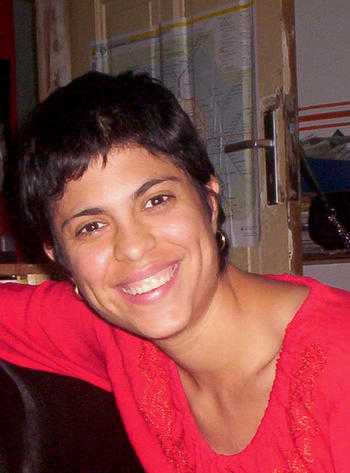Dr. Maria Moscoso

Her principal lines of research address education, childhood studies, memory, migration and gender issues.
Postdoctoral Research Project
How are intergenerational relationships between mothers, fathers and children currently established in the context of Latin American migration to Germany? This question is at the center of the proposed project. In effect, regarding the characteristics of the new Latin American migration to Europe, I consider it necessary to take into account and investigate how globalization transforms and is transformed by the current trajectories of distinct members of the families that move from one place to another. This implies exploring how relationships are reorganized among different members of these families according to generational differences.
The analysis has two dimensions: 1) the organization of these families in Germany, and; 2) the discourse of the boys, girls and young people, as well as mothers and fathers regarding established family relationships between them and other members of the family (brothers, sisters, aunt, uncles, grandparents, new in-laws and other members of the family). The proposed research project is an exploration whose results should lead the way to the establishment of a series of lines of investigation aimed at empirically demonstrating two facts: 1) Generational relationships – understood as those social relationships through which the actions, positions and representations of children and young people and adults – are socially constructed and establish relationships of power and inequality, and; 2) A characterization of contemporary migrations (heterogeneous, multi-class, and multi-ethnic) should be contemplated in a generational dimension that is articulated through the relationships of inequality that, in general, characterize societies and that, in this sense, have a direct bearing on the trajectory of the people, not only on their individual paths but also at a more global level.
One of the objectives of the future project is to address the family reconfigurations of Latin Americans that live in Germany from the generational perspective and from the comparative view. More concretely, this project consists of studying how the migratory experience modifies the generational relationships within families and, in general, between them and different social institutions such as schools. This implies examining how the current family types have created new relationships of power and social inequalities both within as well as outside families and how this influences the social position and social practices, especially for migrant women, children and youth.
Books:
2009 Candela, la hamaca y la ballena, edit. Norma, Quito, Ecuador
2005 Al otro lado del espejo: representaciones sobre el mundo infantil en el nuevo cuento ecuatoriano; serie Magister, Universidad Andina Simón Bolívar, Abya-Yala, Corporación Editora Nacional, Quito.
Articles in Academic Journals:
2012 Poveda, D; Jociles, M; Franzé, A; Moscoso, M. y Calvo, A. “The social construction of immigrant students’ academic trajectories in a Spanish secondary school: a multidimensional ethnographic analysis”. Ethnography and Education Journal. Vol 7., N. 1
2011 Moscoso, M.F. y Viteri, M.A. “Ay Madrecita”. Revista la Página, N. 91, Número 91 (2011, Año XXII, núm. III) Práctica y teoría (marica) Homenaje a Paco Vidarte, Las Palmas, España2009 Moscoso, M.F. “El Club deportivo mirado por Mieles”, Andina Migrante n.2, January, Flacso- Quito
2009 Moscoso, M.F. “Perspectivas de padres y madres (ecuatorianos) sobre el contrato pedagógico entre la institución escolar y la familia en un contexto migratorio”, Papeles de Trabajo sobre Cultura, Educación y Desarrollo Humano Review, UAM, REFERENCIA PTCEDH_09_03, http://www.uam.es/ptcedh
2009 Moscoso, M.F. “La mirada ausente: Antropología e infancia”, Aportes Andinos Review, Universidad Andina Simón Bolívar, Ecuador, www.uasb.edu.ec/padh.php
2008 Moscoso, M.F. “Infancia, migración y memoria: una introducción”, Aportes Andinos Review, Universidad Andina Simón Bolívar, Ecuador, www.uasb.edu.ec/padh.php
2008 Moscoso, M.F. “Migración, escuela y subjetividades infantiles”, Iconos, Social Science Review, Flacso-Ecuador, cuatrimestral, mayo
2006 Moscoso, M.F y Gimeno, J.C. “¿Hay lugar para los estudios culturales andinos en Europa?”, Cuadernos de Filosofía, Madrid
2005 Moscoso, M.F. “A los forajidos…esto ya no nos quita nadie”, Antropología Iberoamericana Review- AIBR, mayo 2005
Chapters in Edited Volumes
2011 Franzé, A. Moscoso, M.F; Calvo, A. “Donde nunca hemos llegado” alumnado de origen latinoamericano: entre la escuela y el mundo laboral; in: Arjona, A. (ed) biculturalismo y segunda generación. barcelona: icaria
2010 Franzé, A. Moscoso, M.F; Calvo, A. ““Donde nunca hemos llegado” Alumnado latinoamericano, escuela y mundo laboral”, in: Grupo interdisciplinario de investigadores migrantes, Familias, niños y niñas y jóvenes migrantes. Rompiendo estereotipos, Madrid: edit. Iepala
2010 Moscoso, M.F “Infancias transnacionales: aproximaciones etnográficas”, in: Miradas transnacionales, Visiones de la migración ecuatoriana desde España y Ecuador, in: Camacho y Hernández, Senami, CEPLAES, Quito
2008 Moscoso, M.F “Nuevos sujetos, nuevas voces: ¿hay lugar para el pensamiento infantil en los estudios transnacionales”, Santamaría, Enrique (edc.) Nuevos retos epistemológicos del transnacionalismo en el estudio de las migraciones, edic. Anthropos, Barcelona
2008 Moscoso, M.F.“La Churona”, en, Mundo Lavapiés, edit. mundolavapiés.net, Madrid
2005 Moscoso, M.F. “Niños, Niñas Indígenas y Migración en Ecuador”, Memorias Congreso Estudiantes de Antropología, Elche
Book Reviews
2010 Moscoso, M.F. “Childhood and migration. From expierence to Agency. Jacqueline Knörr (ed.)”. Empiria. Revista de metodología de Ciencias Sociales, n.19, p.p. 307-310
1999 Moscoso, M.F. “La Otra Cultura, Imaginarios, Mestizaje y Modernización”, en: Antropología, Cuadernos de investigación, N.4. Anthropology Department, Pontificia Universidad Católica del Ecuador University, Quito
In newspaper
Moscoso, M.F. “La educación que se viene. Neoliberalismo pedagógico, genética y educación”. Diagonal Newspaper, Spain. 29-11-2011
http://www.diagonalperiodico.net/La-educacion-que-viene.html
